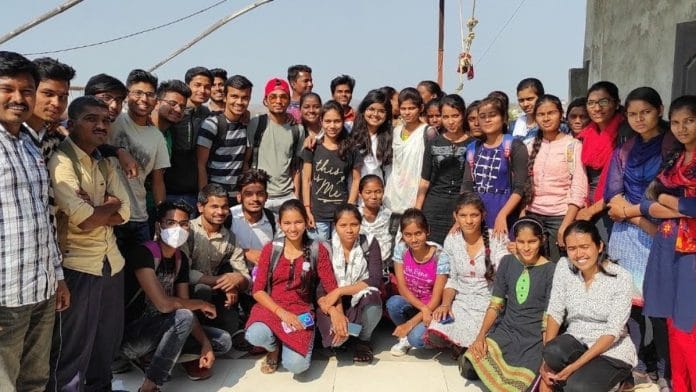Subhash Shankar Kasdekar is studying hard in the tribal pocket of Maharashtra’s Yavatmal to crack international fellowships and scholarships like Chevening, Erasmus, Daad, Felix, and Commonwealth. It is a rare dream for a young man from the Korku tribe of Simori village, surrounded by thick forests in Melghat. He is the first college graduate from his village.
“Not too long ago, I used to struggle to climb trees to search for mobile network in the village,” says Kasdekar, a social work graduate from Yavatmal’s Savitri Jyotirao College of Social Work while recalling overcrowded classrooms in a makeshift mud-walled school with almost no reading material.
But four years ago, he became part of the Eklavya India Foundation that mentors students from Maharashtra’s marginalised communities to help them study in India’s premier educational institutions, such as Jawaharlal Nehru University (JNU), Delhi University (DU), Indian Institute of Technology (IIT), Tata Institute of Social Sciences (TISS), Azim Premji University and Gandhi Research Foundation. Since 2017, over 300 students have undergone rigorous four-month training in aptitude, general knowledge, English, and personality development that helps them ace the competitive entrance exams and interviews in elite universities.
This year, the foundation, started by Raju Kendre who belongs to a nomadic tribe himself, has set a bigger, global goal for its students with the ‘Global Scholars Program.’ It wants to send them to prestigious institutions like Oxford, Cambridge, School of Oriental and African Studies (SOAS), University of London, London School of Economics and Political Science (LSE), University College London (UCL), King’s College London (KCL) and many more.
Kasdekar travelled 250 kilometres from his village in the Melghat region to get a college degree in Yavatmal. “There is a different world outside Melghat,” he said about his discovery. “But now I aspire to travel outside India and bring focus to my village and region that is not even discoverable on the map.”
Also Read: Can’t go to US college? Turkey wants you — here’s what it can & can’t offer Indian students
The challenge of conducting classes
In June, the organisation conducted a three-day workshop on the Global Scholars Program in Wardha, Maharashtra. Over 70 students from states such as Andhra Pradesh, Sikkim, Uttar Pradesh, Bihar, Telangana, Assam and Tamil Nadu attended.
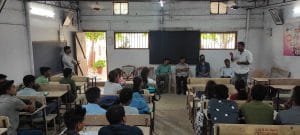
But the road to global institutes is an uphill battle, especially for students from vulnerable communities. Seeing the lack of representation and diversity on a global scale compelled Kendre to initiate this program. He is currently pursuing a second master’s degree at SOAS University of London where he secured admission via the prestigious Chevening scholarship.
After a rigorous screening process, over 70 students from more than 15 states who attended the workshop in Wardha will be mentored for a year in thematic areas. The Herculean process of applications is itself a part of the mentoring process.
With over 80 mentors for the Global Scholars Program and more than 200 for UG and PG programmes, they are, as Kendre describes, the “real backbone” of Eklavya.“Each mentee is assigned one mentor who would guide them through whatever challenges they might be facing including writing SOP (Statement of Purpose), building resumes, and applying for scholarships,” said Smita Tatewar, 24, who was part of the foundational batch of Eklavya in 2019 and now aspires to fly abroad for higher education.
The foundation’s mentoring begins early with higher secondary school-going students. The first step is to offer the idea of a new possibility to village students, and nudge them to un-limit themselves.
Sushant Ramesh Atram, a 17-year-old tribal student from the Kolam community, was happily acing all his classes till the 10th standard in his village Baggi, which is 60 km from Yavatmal. But he did not have any plan for his career. That changed after he enrolled with Eklavya.
“I want to learn coding and hacking,” said Atram, sitting behind his wardrobe full of preparatory books for the Joint Entrance Examination (JEE) while all his clothes hung on a rope in a corner of his room. IIT is on his life’s vision board right now.
After the series of one-day and residential workshops, students are enrolled in classes conducted annually from November to February. Besides comprehension, general knowledge and aptitude, students are also trained for competitive activities such as debates and delivering presentations. “A facilitator often brings up an issue and encourages students to voice their opinions,” said Akash Dhanpal Modak, who coordinates the undergraduate program at Eklavya.
He’s walked the path that many students will embark on, but his journey is far from over. Modak, who belongs to the same community as Bhimrao Ambedkar, is also aspiring to be a global scholar.
Also Read: Week after ABVP blamed him for security guards’ ‘attack’ on students, JNU rector resigns
No place for rote learning
At Eklavya, students are encouraged to voice their opinions and break free from the tyranny of textbooks.
“Good morning, ma’am,” says a student, only to realise a second later that it is evening. She quickly corrects herself. The moderator Ramya, who is conducting the English language support class for aspiring postgraduates, picks up on the silly mistake and smiles.
As Ramya waits for more students to join the class, she asks those already in attendance to summarise what they had learned in the previous session. After a few minutes of silence and further prodding from Ramya, a young student, Shridevi, answers hesitantly in English. “It was regarding vocabulary techniques.” She waits for Ramya to nod her head in acknowledgement and proceeds, this time with more confidence, “You had asked to pick a few root words and then identify each as positive or negative.” As Ramya lauds her effort, Shridevi heaves a sigh of relief.
Ramya turns her attention to the rest of the class. She wants to know if they have been conversing with each other in English. Some students exchange glances and avoid eye contact. Then Sunil steps up: “I and a few of my friends living in the Eklavya house converse with each other in English and it is fun.”
Gradually, other students also chime in and share their experiences. “This is not rocket science. I will definitely learn to converse in English in a year,” says Nagnath, who has been trying to learn spoken English for three months.
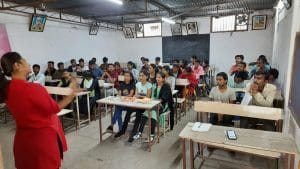
Ramya reminds the students that English is “not a language from the moon.” Her mother tongue is Tamil, and she shares her experience learning new languages. And just like that, everyone has a smile on their face and anecdotes to share.
The offline classes and workshops are conducted at the old campus of Savitri Jyotirao College of Social Work —an institution that has evolved into a recruiting camp for Eklavya.
Nestled in the lap of nature in Yavatmal, it was recently accredited with grade ‘A’ from the National Assessment and Accreditation Council (NAAC). It only offers bachelor’s courses. And that is a conscious choice, according to principal Dr Avinash Vinayakrao Shirke. “I want my students to aim and soar higher. Why limit themselves to just Yavatmal?”
Also Read: NTA exam centres for IITs, AIIMS set to go global. Next wave in Indian education
Melghat: inspiration behind Eklavya
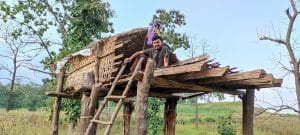
Vidarbha typically makes national headlines for agriculture distress and farmer suicides. It is not every day that young people leapfrog from Vidarbha villages and make it big. Kasdekar, who is gearing up to begin his postgraduate studies this month, hopes to become a beacon of hope for younger members of his community.
Over 250 km from Yavatmal, Melghat—home to over 300 tribal villages— is infamous for its crippling malnourished population and is even deprived of basic amenities and infrastructure.
“A Jio tower was installed in the area four years ago but it is still not operational,” said Kasdekar. A text message on the mobile phone normally takes two to three days to get delivered. “If we have to commute to Yavatmal, there is just one bus on the route. If you miss that, you will be stalled for another day.”
It was Melghat’s debilitating situation that nudged Kendre to begin Eklavya in the first place.
Also Read: Himanta slams ‘disease of disparity’ in Twitter spat with Kejriwal over Assam schools
Unearthing ‘real’ challenges
Over the years, several educational platforms like BYJU’S and Unacademy have emerged as an alternative to offline modes of education. “But how will a tribal child avail that service?” asks Kendre.
While Eklavya can help students stand on their feet and aim for academic excellence, the immediate change of surroundings and survival in prestigious institutions is often daunting for many.
Radhika Laxman Tak, who interned with Eklavya in 2020 during her mid-semester break at TISS, specialises in the field of mental health and is currently working as a depression counsellor in Bhopal. Beyond mentor-mentee relationships, Tak also keeps in touch with each student via frequent check-in calls.
She recalls one of their “brightest students,” who had cracked all PG entrance exams and fellowships he had applied for. But the ‘real challenge’ began only after he was admitted to TISS Hyderabad. “He was finding it hard to cope with the pressure of an advanced master’s course. The pace and language of teaching were increasingly becoming challenging. It reflected in his grades too. He began to show signs of depression,” said Tak, who helped the student connect with a therapist.
Spending three years in Yavatmal and attending Eklavya classes is not the hurdle. It’s life in premier institutions, where cultural changes and academic pressures extract a massive toll on students’ health.
“Their economic struggles could be similar on the face of it but each student has their own set of challenges to overcome,” says Tak, who herself belongs to a nomadic tribe in Wardha.
Helming a non-profit organisation with meagre funds is another constant struggle for Eklavya and its custodians. Besides crowdfunding and relying on the goodwill of mentors, the organisation is often left with little to nothing to make ends meet.
However, according to Modak, The Nudge Incubator, a Bengaluru-based catalyst for the non-profit sector, has been a “godsend” for the organisation. It provided Eklavya with seed funding in 2021, which has been of significant help.
Sometimes, all that is needed is one person to trigger a chain reaction. Shubhangi Bhimrao Botare, a teenager from Kalamb block, was determined to become the first woman in her family—and her village—to step out of the state in pursuit of education. Today, the young woman from the Gowari tribal community is pursuing an MA in Development Studies from Azim Premji University, Bengaluru.
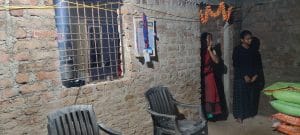
Back home, as the sun sets, a torch light from a mobile phone is the only ray of light out of the narrow lanes of Parsodi village. At an age when most women are persuaded to marry and ‘settle down,’ Gumfa Bhimrao, Shubhangi’s mother, is adamant that her three daughters get an education.
Her second daughter, Shruti, followed in the footsteps of her sibling and went on to study at Fergusson College in Pune. “I desperately wanted my daughters to have a different future than mine,” said Gumfa while sitting in her dimly lit, one-room shanty with exposed brick walls. She recalls her harrowing experiences as a daily-wage worker on a farm. It is not the future she envisions for her daughters.
Her youngest child, Pooja,17, stands silently in a corner waiting for everyone to finish their tea. She may appear shy, but she knows exactly what she wants, and opts for a road not taken by her sisters: “I want to go to JNU.”
(Edited by Zoya Bhatti)



